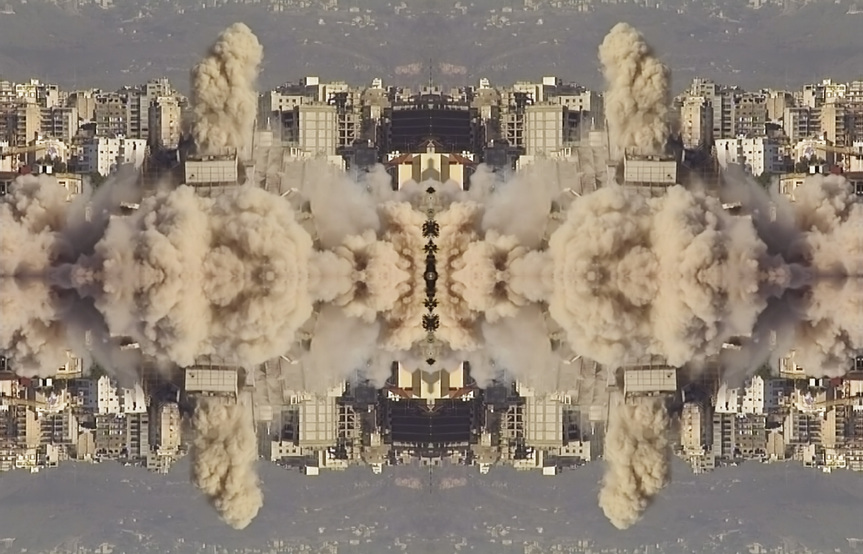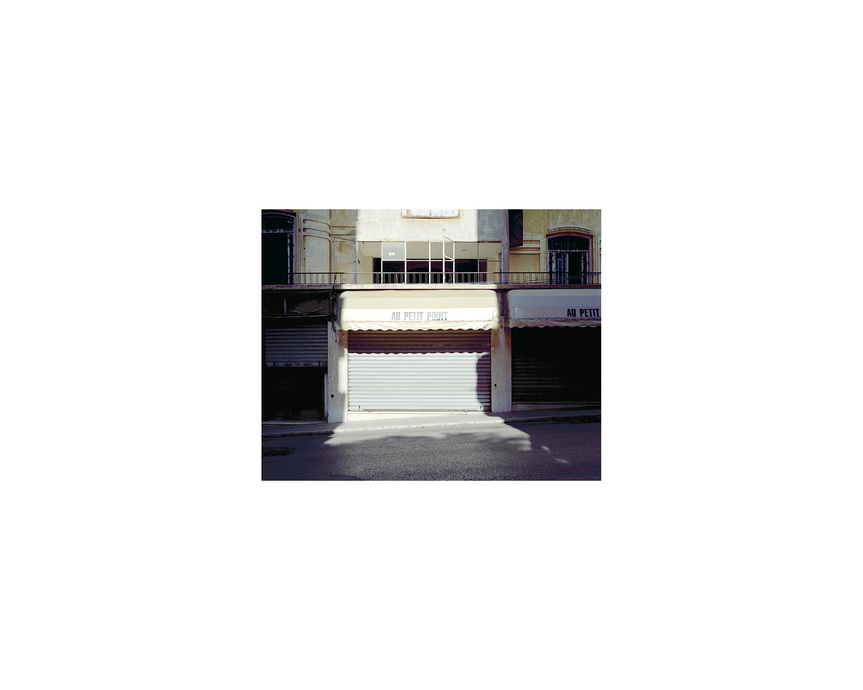-
From Current Issue
-
- Editor’s Letter Fire in the Heart
- Reviews I Gusti Ayu Kadek Murniasih
- Reviews 11th Seoul Mediacity Biennale: “One Escape at a Time”
- Dispatch Networked China
- One on One Monira Al Qadiri on Yukio Mishima
- Essays The rise of independent art spaces in pandemic-era Shanghai
- Features Tuan Andrew Nguyen
- Table of Contents
- Web Exclusives
- Archive
- Subscribe

R
E
V N
E
X
T
Installation view of WALID RAAD‘s Sweet Talk: Commissions (Beirut)_Solidere 1994–1997, 2019, panoramic single-channel video, looped: 3 minutes 51 seconds, at Walid Raad’s solo exhibition, Paula Cooper Gallery, New York, 2019. Photo by Steven Probert. All images courtesy Paula Cooper Gallery, New York.
Beirut appeared in many varying forms throughout Walid Raad’s solo exhibition at New York’s Paula Cooper Gallery. Its most striking depiction was in a looped video, from the artist’s decades-spanning, ongoing “Sweet Talk” series. Titled Sweet Talk: Commissions (Beirut)_Solidere 1994-1997 (2019), the kaleidoscopic footage took up an entire wall at the exhibition space, immersing viewers in images of buildings gracefully bursting into clouds of detritus. From these explosions, the structures rise again, morphing into other edifices amid trees and blue skies, like a phoenix emerging from the ashes. Raad had sourced the raw footage from the former residents of the featured buildings, who had recorded the destruction of their homes—part of Beirut’s aggressive urbanization project in the mid-1990s, following the Civil War. The government’s attempt to provide space for a polished urban cityscape in the Beirut Central District meant that old apartments, marred by the conflict, were torn down. The effect of the incessant shrinking and blooming of the city in the work, was, however, a kind of numbing in the viewer, akin to semantic satiation—the psychological phenomenon of a word gradually losing its meaning through repetition. Meanwhile, the apparently fluid transformations of the buildings underscored the malleable nature of memories, and the cyclical nature of war and displacement.
Marking alternative routes through the past has long been a fascination for Raad, whose multidisciplinary work, created under the guise of The Atlas Group, blurs the line between imagination and reality. Taking as his subject matter people who could have lived amid actual sociopolitical situations and the objects they could have left behind, his Atlas Group projects prompt questions on the extents of knowledge and what we view as truth. Raad seems to ask, “Are we able to know and remember everything?” In the exhibition, Raad similarly toyed with the mechanisms through which we draw out supposed fact. Commissions (Beirut) (1984), again, from his “Sweet Talk” series, is a multifaceted portrait of post-war Beirut. Snapped by a 17-year-old Raad in 1984, upon the request of his cousin, who was a militia member, the pictures show shuttered business storefronts, intimately-scaled and shrouded by a ghostly sense of abandonment. At first glance, they appear to be documents evidencing a specific period in Beirut’s shifting, tumultuous landscape. Only upon reading the wall text beside the photos can visitors glean that the businesses were shut down due to the owners’ refusal to pay protection money to the militia during the Civil War. By suspending the contextual information, Raad recreates his own experience of how he came to understand the images—he only learned of the facades’ significance years after he had captured them—and draws attention to the nature of half-truths.
The wall text for another group of works from the same series left more room for ambiguity. The text tells the story behind a series of photographs depicting a black-and-white book, which Raad had found at a Beirut flea market in 1994. Raad identifies the author of the book’s images as under-recognized Lebanese photographer Ahmed Helou, and explains that he was impressed by the handwritten notes left in the publication by ostensibly anonymous people, in Arabic and English. “While walking with my mother on this street in 1976, she tells me that my grandparents will be leaving East Beirut to Amman immediately. It took me another 10 years to find out why,” one of the notes read. The vagueness surrounding Raad’s discovery of the publication by Helou, and the speculations that both Raad and the photo-book’s anonymous contributors make about the images and their contents veils the work in a nebulous haze. This, in turn, begs the question: is it necessary that images contain truth?
Walid Raad’s solo exhibition is on view at Paula Cooper Gallery, New York, until May 24, 2019.
To read more of ArtAsiaPacific’s articles, visit our Digital Library.

















